What is proximate cause in insurance information
Home » Trend » What is proximate cause in insurance informationYour What is proximate cause in insurance images are available in this site. What is proximate cause in insurance are a topic that is being searched for and liked by netizens now. You can Get the What is proximate cause in insurance files here. Find and Download all royalty-free vectors.
If you’re looking for what is proximate cause in insurance pictures information related to the what is proximate cause in insurance keyword, you have pay a visit to the right blog. Our website always provides you with hints for downloading the maximum quality video and image content, please kindly surf and locate more enlightening video articles and graphics that match your interests.
What Is Proximate Cause In Insurance. This video introduces proximate cause and compares it with actual cause in a negligence lawsuit.uslawessentials.comopening song courtesy of bensound.com Proximate cause is the primary cause of an injury. It deals with finding out what is the closest/first cause of the loss. Proximate cause refers to a direct cause of loss, without which the loss would not occur;
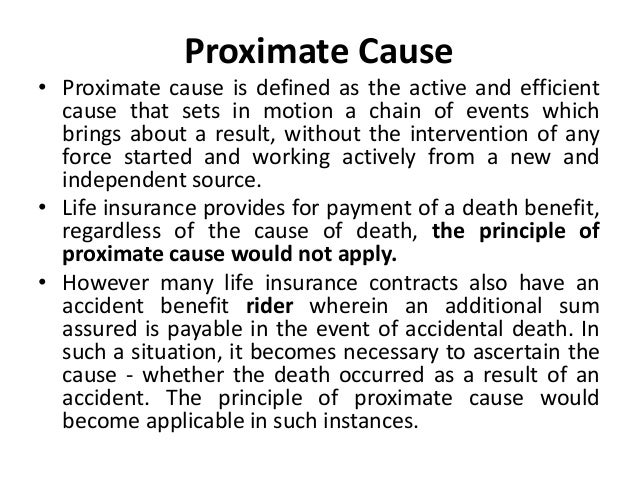 Principles & practices of insurance com 334 From slideshare.net
Principles & practices of insurance com 334 From slideshare.net
If the original cause, the ultimate cause, the proximate cause for the claim is excluded, then the whole claim is invalid. Proximate cause an act from which an injury results as a natural, direct, uninterrupted consequence and without which the injury would not have occurred. Proximate cause is an act, whether intentional or negligent, that is determined to have caused someone else’s damages, injury, or suffering. It deals with finding out what is the closest/first cause of the loss. Click to see full answer. Proximate cause refers to the first event, or first peril, in a series of events that cause damage in an insurance claim.
1) the activity must produce a foreseeable risk.
Sometimes when a claim occurs, the exact cause of the damage is not always clear or there may have been one. It has been well defined in the leading case of pawsey v. Courts employ a set of proximate cause rules to resolve causation disputes when a property. The question of proximate cause. Because the insurance may not cover the actual cause of the accident, a policy buyer should make sure. Proximate cause refers to the first event, or first peril, in a series of events that cause damage in an insurance claim.
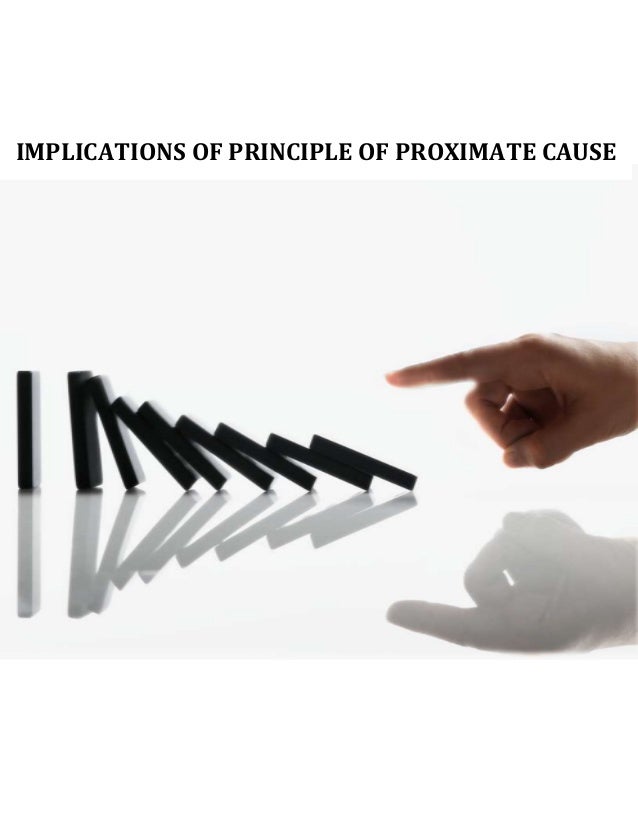 Source: slideshare.net
Source: slideshare.net
It is not necessarily the closest cause in time or space nor the first event that sets in motion a sequence of events leading to an injury. Proximate cause is an act, whether intentional or negligent, that is determined to have caused someone else’s damages, injury, or suffering. This video introduces proximate cause and compares it with actual cause in a negligence lawsuit.uslawessentials.comopening song courtesy of bensound.com Insurance companies place a maximum on the amount of coverage for a single event. If the original cause, the ultimate cause, the proximate cause for the claim is excluded, then the whole claim is invalid.
 Source: slideshare.net
Source: slideshare.net
Proximate cause is the primary cause of an injury. The important point to note is that the proximate cause is the nearest cause and not a remote cause. Something which is either carelessly or intentionally caused and results in someone�s injuries or distress. Insurance companies place a maximum on the amount of coverage for a single event. Proximate cause is the primary cause of an injury.
 Source: slideshare.net
Source: slideshare.net
Proximate cause is a key principle of insurance and is concerned with how the loss or damage actually occurred and whether it is indeed as a result of an insured peril. Scottish union and national (1907) as follows : This section provides a definition of proximate cause and explains how it should be determined in practice. If the original cause, the ultimate cause, the proximate cause for the claim is excluded, then the whole claim is invalid. Actual cause exists when the defendant�s actions are the direct, factual cause of the plaintiff�s injuries.
 Source: slideshare.net
Source: slideshare.net
Also know, what does the issue of proximate cause boil down to? It deals with finding out what is the closest/first cause of the loss. Courts employ a set of proximate cause rules to resolve causation disputes when a property. It has been well defined in the leading case of pawsey v. Because the insurance may not cover the actual cause of the accident, a policy buyer should make sure.
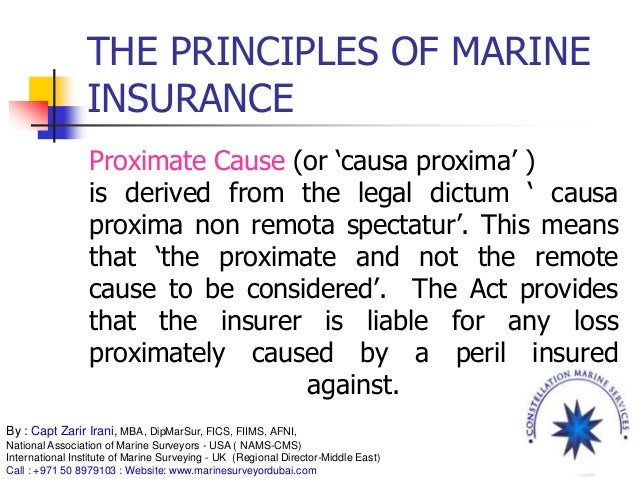 Source: slideshare.net
Source: slideshare.net
When a claim occurs under a general insurance policy the insurers will identity the proximate cause of the loss to ensure that the loss or damage has been caused by an insured peril but what is proximate cause and how does this affect the settlement of claims. Therefore, it is a highly relevant principle in the insurance industry. 8.1 proximate cause definition proximate cause was defined in the case of pawsey v scottish union &. The question of proximate cause. Proximate cause is an act, whether intentional or negligent, that is determined to have caused someone else’s damages, injury, or suffering.
 Source: insuranceliya.com
Source: insuranceliya.com
Proximate cause refers to a direct cause of loss, without which the loss would not occur; Proximate cause is a key principle of insurance and is concerned with how the loss or damage actually occurred and whether it is indeed as a result of an insured peril. Proximate cause is the primary cause of an injury. Therefore, it is a highly relevant principle in the insurance industry. Sometimes when a claim occurs, the exact cause of the damage is not always clear or there may have been one.
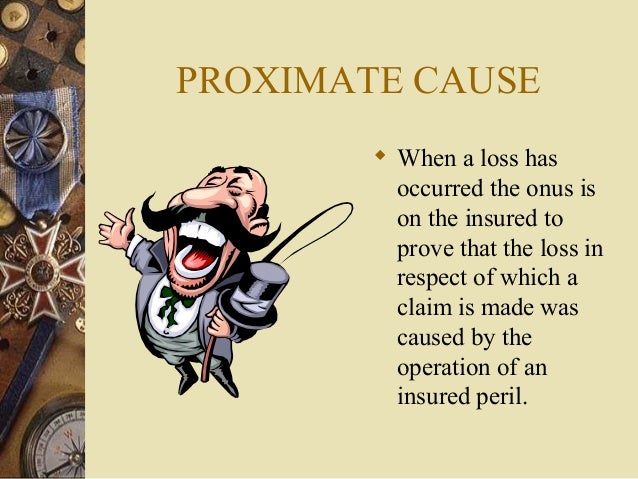 Source: slideshare.net
Source: slideshare.net
This video introduces proximate cause and compares it with actual cause in a negligence lawsuit.uslawessentials.comopening song courtesy of bensound.com It deals with finding out what is the closest/first cause of the loss. Proximate cause refers to a direct cause of loss, without which the loss would not occur; Click to see full answer. This section provides a definition of proximate cause and explains how it should be determined in practice.
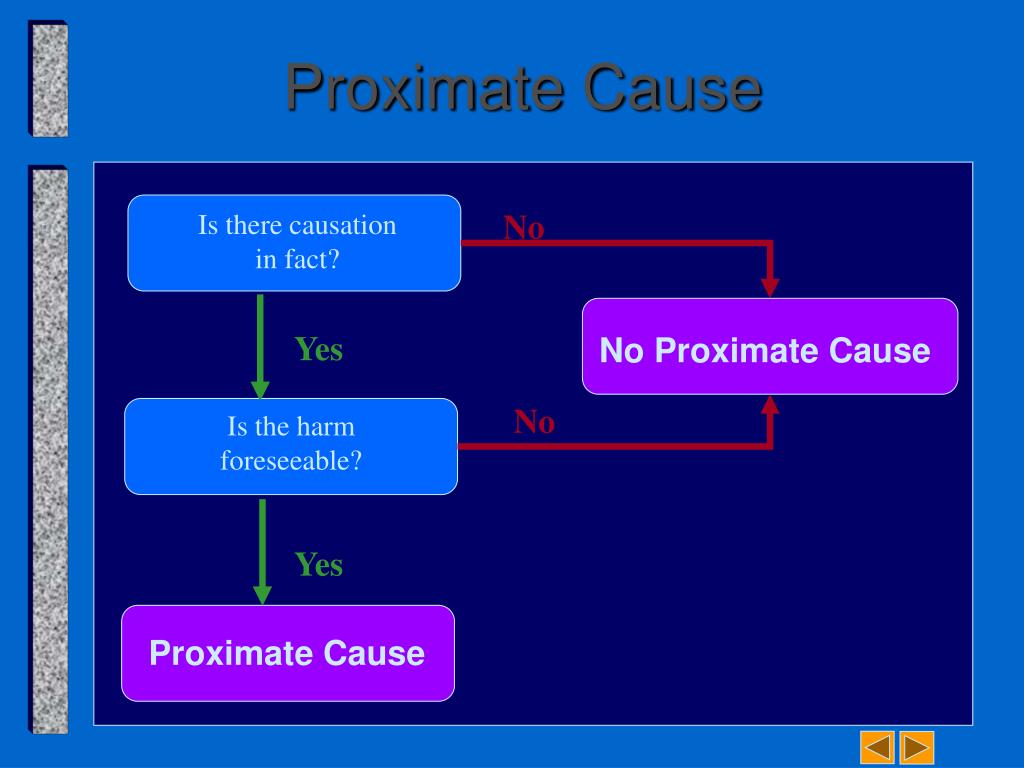 Source: slideserve.com
Source: slideserve.com
Therefore, it is a highly relevant principle in the insurance industry. Proximate cause is a key principle of insurance and is concerned with how the loss or damage actually occurred and whether it is indeed as a result of an (5). Proximate cause is the primary cause of an injury. What is proximate cause in insurance? “proximate cause means the active, efficient cause that sets in motion a train of events which brings about a result, without the intervention of any force started and working actively from a new and independent source”,’ it is the immediate cause and not.
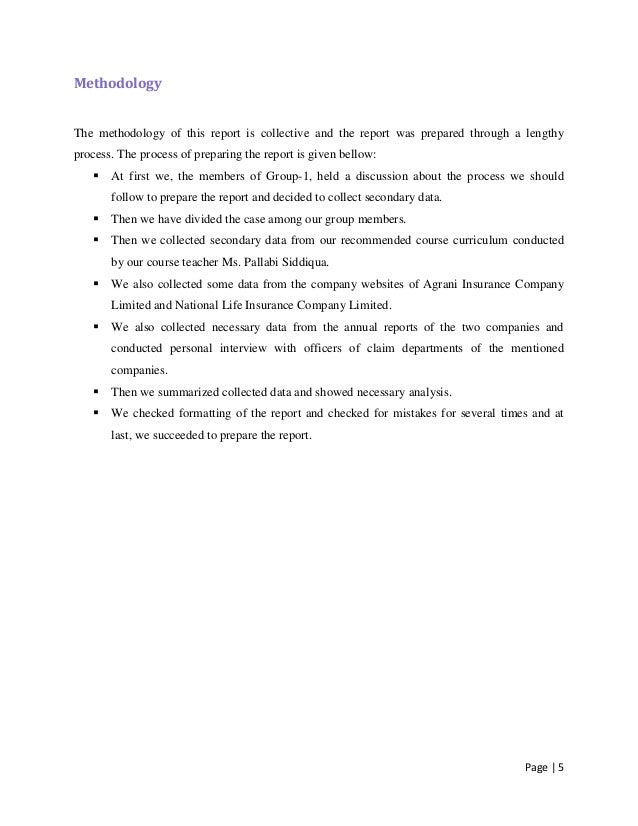 Source: slideshare.net
Source: slideshare.net
If the original cause, the ultimate cause, the proximate cause for the claim is excluded, then the whole claim is invalid. This video introduces proximate cause and compares it with actual cause in a negligence lawsuit.uslawessentials.comopening song courtesy of bensound.com Proximate cause refers to the first event, or first peril, in a series of events that cause damage in an insurance claim. Proximate cause an act from which an injury results as a natural, direct, uninterrupted consequence and without which the injury would not have occurred. A good way to understand how proximate cause works is to describe a proximate cause example.
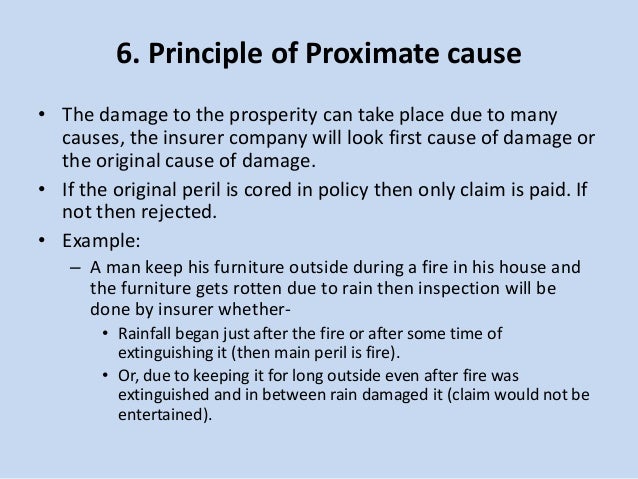 Source: driverlayer.com
Source: driverlayer.com
It has been well defined in the leading case of pawsey v. 1) the activity must produce a foreseeable risk. Proximate cause refers to the first event, or first peril, in a series of events that cause damage in an insurance claim. Actual cause exists when the defendant�s actions are the direct, factual cause of the plaintiff�s injuries. This principle states that the closest cause for any particular loss will be considered when it comes to making an insurance claim payment.

Proximate cause is used in civil and criminal cases, and are frequent in personal injury legal cases. Proximate cause is a key principle of insurance and is concerned with how the loss or damage actually occurred and whether it is indeed as a result of an insured peril. Actual cause exists when the defendant�s actions are the direct, factual cause of the plaintiff�s injuries. Proximate cause refers to a direct cause of loss, without which the loss would not occur; What is the proximate clause?
 Source: youtube.com
Source: youtube.com
This principle states that the closest cause for any particular loss will be considered when it comes to making an insurance claim payment. Proximate cause refers to the first event, or first peril, in a series of events that cause damage in an insurance claim. Proximate cause an act from which an injury results as a natural, direct, uninterrupted consequence and without which the injury would not have occurred. Identifying the cause of loss in general insurance claims. A key principle of insurance, the proximate clause is used by loss adjusters “ to assess the exact cause of the damage or loss and determine whether that particular cause is covered by the policy.” two key court judgements* illustrate the kind of distinctions made.
 Source: slideshare.net
Source: slideshare.net
Proximate cause refers to the first event, or first peril, in a series of events that cause damage in an insurance claim. What is the proximate clause? The important point to consider here is that proximate cause is the only nearest cause and not the remote cause. Proximate cause, where cause in fact is a direct approach from the action to the result and whereas proximate cause is a study of series of events and the process to determine as to what actually led to the loss. Scottish union and national (1907) as follows :
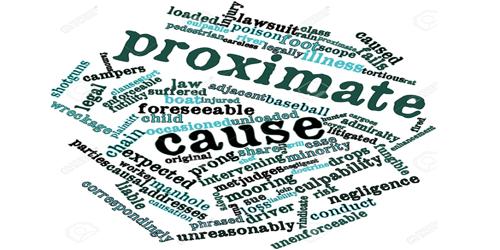 Source: qsstudy.com
Source: qsstudy.com
In the context of a car accident case, the concept of proximate cause refers to the act (or failure to act) that was the legal cause of the auto accident, and led. Insurance companies place a maximum on the amount of coverage for a single event. Proximate cause means the active, efficient cause that sets in motion a train of events that brings about a result without the intervention of any force started (6). Proximate cause an act from which an injury results as a natural, direct, uninterrupted consequence and without which the injury would not have occurred. Proximate cause is the primary cause of an injury.
 Source: driverlayer.com
Source: driverlayer.com
Scottish union and national (1907) as follows : “proximate cause means the active, efficient cause that sets in motion a train of events which brings about a result, without the intervention of any force started and working actively from a new and independent source”,’ it is the immediate cause and not. This video introduces proximate cause and compares it with actual cause in a negligence lawsuit.uslawessentials.comopening song courtesy of bensound.com Proximate cause is the primary cause of an injury. What is proximate cause in insurance?
 Source: mymbaguide.com
Source: mymbaguide.com
- the injury must be. 2) the injury must be. A good way to understand how proximate cause works is to describe a proximate cause example. Proximate cause is a key principle of insurance and is concerned with how the loss or damage actually occurred and whether it is indeed as a result of an insured peril. Proximate cause is an act, whether intentional or negligent, that is determined to have caused someone else’s damages, injury, or suffering.
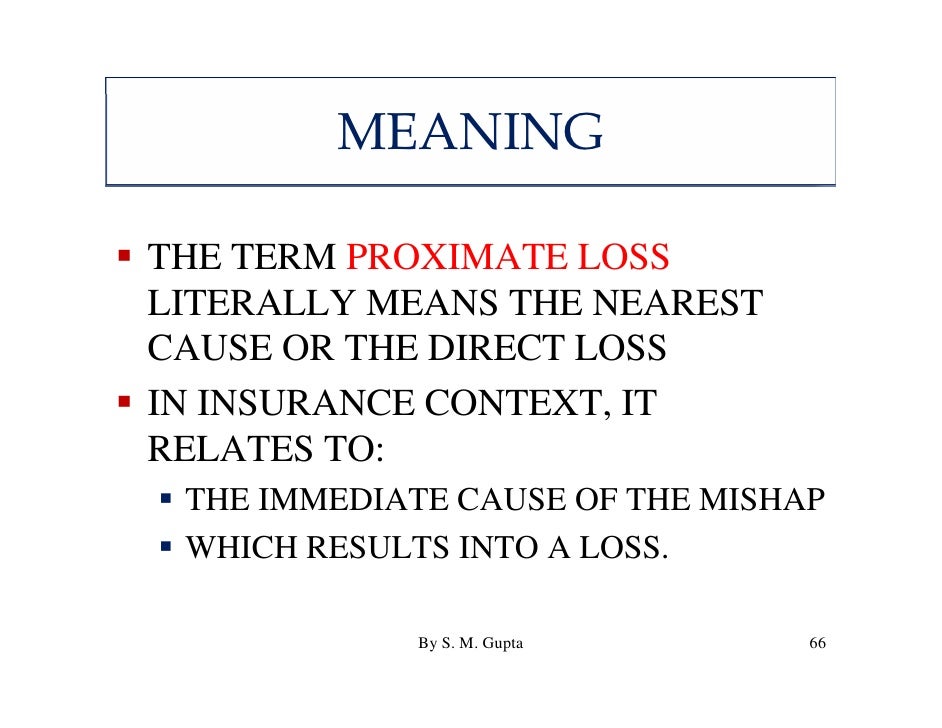 Source: slideshare.net
Source: slideshare.net
When a claim occurs under a general insurance policy the insurers will identity the proximate cause of the loss to ensure that the loss or damage has been caused by an insured peril but what is proximate cause and how does this affect the settlement of claims. This concept is fundamental to insurance, because you have to know whether the claim stems from a covered risk. Also know, what does the issue of proximate cause boil down to? Proximate cause is an act, whether intentional or negligent, that is determined to have caused someone else’s damages, injury, or suffering. Proximate cause an act from which an injury results as a natural, direct, uninterrupted consequence and without which the injury would not have occurred.
 Source: study.com
Source: study.com
The important point to note is that the proximate cause is the nearest cause and not a remote cause. In the context of a car accident case, the concept of proximate cause refers to the act (or failure to act) that was the legal cause of the auto accident, and led. It is important that courts establish proximate cause in personal injury cases because not everyone nor everything that causes an injury can be held legally liable. A proximate cause is the first event in a chain of events that gives rise to a claim. Proximate cause is the primary cause of an injury.
This site is an open community for users to share their favorite wallpapers on the internet, all images or pictures in this website are for personal wallpaper use only, it is stricly prohibited to use this wallpaper for commercial purposes, if you are the author and find this image is shared without your permission, please kindly raise a DMCA report to Us.
If you find this site serviceableness, please support us by sharing this posts to your preference social media accounts like Facebook, Instagram and so on or you can also bookmark this blog page with the title what is proximate cause in insurance by using Ctrl + D for devices a laptop with a Windows operating system or Command + D for laptops with an Apple operating system. If you use a smartphone, you can also use the drawer menu of the browser you are using. Whether it’s a Windows, Mac, iOS or Android operating system, you will still be able to bookmark this website.

Category
Related By Category
- Vicarious liability insurance definition Idea
- Staples insurance information
- Youi car insurance claim Idea
- T mobile insurance for iphone x information
- Shelter insurance fayetteville ar information
- Roger smith insurance Idea
- Scotia insurance eastern caribbean limited Idea
- Toronto condo insurance average rates information
- Sell life insurance policy calculator Idea
- Velox insurance hiram information